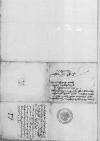Ew(e)r F(urstlichen) D(urchlauch)t ⌊⌋, das ich gestrigs tags von(n) meinem(m) diner erhalten(n), / hoth mich so hochlich erfrewet, ( dieweil ich selbst / meyn(n)em vor nemen(n) noch, / von wegen(n) etlicher meins leibs gebrechen vorhindert, nicht mag kegenwertig sein ) das ich nicht hab mocht nochlossen(n), E(wer) F(urstliche) D(urchlauch)t mit dissem meinem(m) schreiben(n) zu besuchen(n), / der ich uffs hochste thu danken(n), das die mein(n) svermuttigheit gelindert / und mich aus sorglichen weitlofftigen(n) bedencken(n), / darin mich aus vil ursachen(n) das erschrecklich gerucht gefurt, / entsaczt hoth. / Got der almechtig erfrewe E(wer) D(urchlauch)t noch al irem willen(n) widerum(m)b / und behut die vor aller trubseligheit zu ewigen(n) geczeiten(n).
Vor andere zceitungen(n) von ko(nigliche)m hove, / und nemlich das in ⌊deuczen(n) landen(n)⌋ gut fried und einigheit seÿ, / sage ich ouch E(wer) F(urstlichen) D(urchlauch)t grossen(n) danck. / Wolt Got, das es ervolgte, was ich negst an ⌊ro(mische)r ko(nigliche)n m(aieste)t⌋ hoff gehort, / das ire und ⌊kay(serlich)e m(aieste)t⌋ mit andern(n) des reichs kur und furst(en) dar an wolten(n) sein, / do mit von(n) beiden(n) teilen(n) leidliche wege un(n)d mittel gefunden(n) wurden(n), / das die zuteilte kirche widerum(m)b in sich selbst kuem(m), / welchs / meins bedunckens / mit zu that gotlicher(r) gnaden(n), / so ein teil dem anderen(n) etwas der billicheit noch gebe, / ane vil co(n)cilia oder zcanks wol mocht geschen(n). / Das hel superinscribed⌈ll superinscribed⌉fft uns Got erleb(e)n etc.
Ouch wil ich fruntlicher(r), dinstlich(e)r weis E(wer) F(urstlichen) D(urchlauch)t nicht bergen(n), das ich morgen(n) oder ufs lengst den tag dar noch an ko(nigliche)n hoff, / wie im negst(en) ⌊⌋, / meinen(n) diner wil abfertigen(n). / Ists noch E(wer) D(urchlauch)t gefellig etliche brive mitzugeben(n), / sollen(n) mit trew un(n)d fleis geantwurt werden(n). / Hiemit thu ich mich in die alte gunst, / welche ich bisher(r) bey E(wer) F(urstlichen) D(urchlauch)t alwegen(n) gespurt, wie meinem(m) hochgelibten(n) hern(n) und freunde / freunttlich und dinstlich befolen(n). /
 GStA, PK, HBA, C 1, No 532, f. 2 unnumbered
GStA, PK, HBA, C 1, No 532, f. 2 unnumbered  GStA, PK, HBA, C 1, No 532, f. 1 unnumbered
GStA, PK, HBA, C 1, No 532, f. 1 unnumbered 
